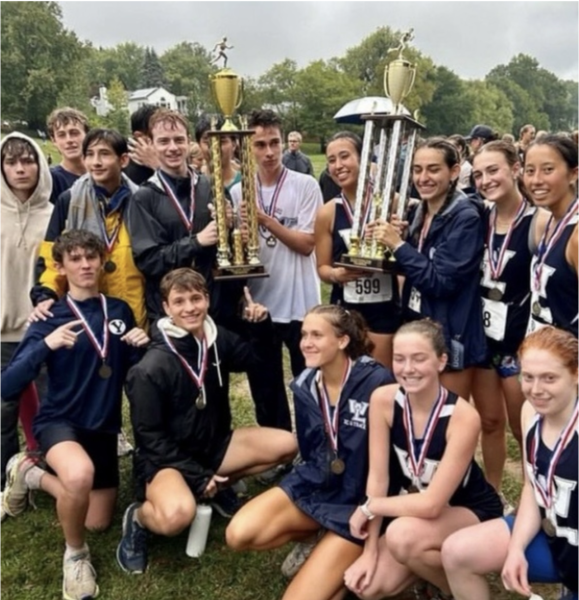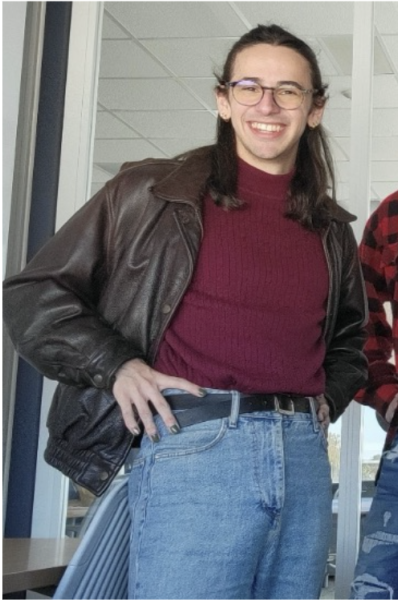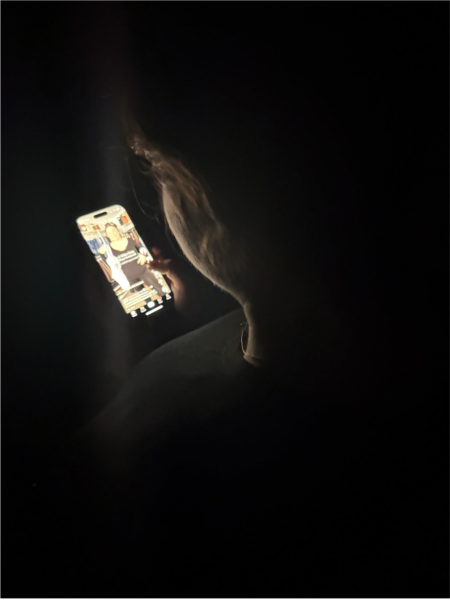International education
Students Discuss Why They Chose to Go to College Abroad
A student prepares to walk to security with their family with a suitcase in hand. What if they also have to get their passport stamped at the airport of their destination?
After hearing good things about the school from her sister, Senior Maya Sanz-Kimura, who plans to attend the University of St. Andrews in Scotland, thinks there are many positives to attending college abroad.
“[I am excited to meet] a new group of people, international people,” Sanz-Kimura said. “I feel like [these are] people that I wouldn’t have met if I stayed in the U.S. [for college].”
Due to rolling admissions, Sanz-Kimura heard back from the University of St. Andrews in October.
She thinks there are other pros to college outside of the United States. With a mom from Japan and a dad from Puerto Rico and Spain, she always wanted to do at least a year abroad.
“My sister ended up going to [the University of] St. Andrews and I visited and I really liked it and she also really loves it,” Sanz-Kimura said. “It’s also a better school system in Scotland than it is in the U.K. because it’s just three years in England versus Scotland with just four years. So the Scottish school system kind of is similar to the American school system in that way.”
Another senior, Irene Ortiz, is a senior exchange student from Spain who plans to go to college at Charles III University of Madrid. Due to the different schedules and tests, she will hear back from the school on her acceptance in July. She became an exchange student for many various reasons.
“Well, I really wanted to improve my English,” Ortiz said. “I wanted to do something different because my whole life I’ve been going to the same private Catholic school. So I really wanted a change. I really wanted to change environments and to get the chance to meet new people before becoming an adult.”
Ortiz’s mom was an exchange student and stayed with a family in the United States. She contacted the woman her mom stayed with about becoming an exchange student.
“[My mom] contacted her, and she was like, ‘Hey, I’m looking for agencies, can you help me out,’” Ortiz said. “[My mom’s host family member] was like, ‘Wait, she’s gonna stay with the brand new family. No, no, no, no, bring her with us.’”
Her host family included three other children.
She is also a part of a bigger exchange student program with two people that check in on her, a Spanish liaison and an American liaison. These employees of the exchange program handle problems within the problem, talk about the cultural shock and ensure grades stay up. When Ortiz went to the school, she was happy about some aspects of the school.
“My favorite part is definitely the school spirit and how even though our grades are so big, way bigger than my grade in Spain used to be, everyone’s kind of a community,” Ortiz said. “There’s so much pride, we do assassins which is so much fun. There’s so many activities, we have spirit week. All of those are things that you wouldn’t get to see in other countries.”
Similarly, she is looking forward to attending the University of Charles III in Madrid.
“I’m really excited to be an adult and meet new people, obviously because people always see that college is the best years of your life,” Ortiz said. “So I’m just super excited to live that life and feel if it’s true, take classes that I know that I will 100% like. I’m also really interested in kind of affiliating with a political party when I go back…I’m just excited to be more independent than here.”
On the other hand, she has some reservations about the University of Charles III in Madrid.
“I’m super nervous about not making friends or not connecting with new people there,” Ortiz said. “When I first came here my expectations were super high and then I found a really nice group of friends, but it took a very long time and I feel like there’s a lot of cliques here. Especially if you get to your senior year and all the groups have been formed and they’ve known each other since at least freshman year, but most of them have been friends since elementary school.”
There are some key differences between college in the United States and Spain. For example, students often live independently in dorms provided by the school in the United States. It can be difficult for students to see their family often.
“In Spain, how it works is that you live with your parents while you study for college,” Ortiz said. “So in my case, I live in the capital city so basically, the college is outside. So you have to take a train every morning. It’s like an hour train, depending on where you go, obviously, but for me it would be an hour and a half.”
It is a different college experience as a result.
“You still hang out with your friends from school,” Ortiz said. It’s not like you say goodbye to your high school life. You still live with your family and your high school friends. It’s not a fresh start from zero.”
Ortiz plans to study law in college to prepare for a famously difficult exam, similar to the bar exam in the United States. There are big gains, however, for passing this test and she believes it is worth it.
“If you take the test and you pass, then you work for the government, and it’s so comfortable, you can never get fired,” Ortiz said. “Then every day your schedule would be starting at 9 a.m. and then leaving at 3 p.m., you live a really good life.”
However, government work is not her primary ambition.
“My dream job would be entering into politics and becoming a politician,” Ortiz said. “Obviously, the goal is [to be the] first woman president of Spain. That’s like the goal.”
Senior Luisa Blacker has different goals. She is from Brazil but moved in her junior year after her parents got new jobs. Next year, she will be attending Oxford University and studying history. One of the reasons she chose to go abroad to Oxford is because she plans to stay in England after graduation, and there are more job opportunities for her major in England.
“If I stayed home [in Brazil], I would have to do something stereotypical that gives you money because presently society kind of works like that,” Blacker said. “I’d have to do law or something, that’s not something that I enjoy.”
On the other hand, Sanz-Kimura wants to major in sociology and anthropology at the University of St. Andrews. To apply, Sanz-Kimura had to fill out the University and Colleges Admissions Service (UCAS) application. This serves as the equivalent to the United States Common Application (Common App) in the United Kingdom. There are some key differences between the UCAS system and Common App. One of the differences is within the personal statement. A UCAS personal statement talks about who the applicant is within their major, while a Common App personal statement describes them holistically. Sanz-Kimura wrote about herself within her anthropology major in her UCAS personal statement.
“[I wrote about] why I’m fit for the anthropology program and how I spent my summers in Japan, and I like to teach and teach little kids English there,” Sanz-Kimura said. “[I wrote about] how I take different languages in school and just how I like to help people and how I speak three languages.”
Sanz-Kimura fluently speaks Japanese, Spanish and English.
According to Blacker, there are extra steps for some colleges, such as Oxford.
“I had to do a history exam to get in, and then after I did the exam, they cut off a bunch of people that didn’t do well on the exam,” Blacker said. “Then those people that passed to the next stage, have to do an interview and the interview is not so like a ‘who you are as a person’ interview. Again, it’s an oral exam.”
For Blacker, this meant that she got a historical source and had to analyze it in real-time and discuss it with them. Blacker wrote about different things from Sanz-Kimura in her personal statement.
“I basically said that I’m interested in how history kind of creates this idea about the past that can influence how people feel about their own countries,” Blacker said. “I compared my experience in Brazil with that in the US, like how history shapes how we think about ourselves. Then I talked about a few books and I talked about the civil rights movement. It was only about that. Then I talked about some extracurriculars I did relating to history, I had an internship at Georgetown [with a historian]….Then I talked about also how some of my other classes like, film and English, had helped me in history.”
Students can apply to up to five schools with their UCAS application. Blacker applied to Oxford University, the University of St. Andrews in Scotland, the University of Edinburgh, University College London (UCL) and Durham University. As the school is far away, Blacker has not visited, which makes her nervous because she is going in blind.
“Everyone says it’s always cloudy, always raining and I am Brazilian,” Blacker said. “I am used to heat and extreme sweat and all that so it’s gonna be definitely a change… I’ve been going on Google Maps a lot and just trying to see how the vibe is but I’m going again from that family friend’s experience and also just what the internet says.”
One thing she thinks helped was that she was an IB diploma candidate because students that do not do IB often have to do an extra “introductory” year.
“I went to an international school in Rio [De Janiero],” Blacker said. “I’ve been in IB for three years, like someone needs to let me out.”
All three students encourage students to study abroad. According to an International Education of Students (IES) survey, 64% of employers think that an international experience is important for recruitment.
“I think at least studying abroad for one year is super eye-opening,” Ortiz said. “You’ll learn a lot about other cultures [and] it helps you to learn more about the language, your second language. Now, I feel like I can express myself way better than I used to. And it’s just a super great experience.”











